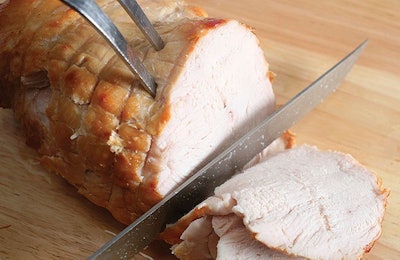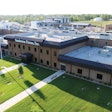
Overall turkey production fell slightly in 2018 due to challenging market conditions, according to WATT PoultryUSA’s 2018 Top Poultry Company rankings.
As a whole, the top U.S. turkey companies produced 60 million less pounds of live turkeys in 2018 after increasing production in 2016 and 2017. In total, the top 22 companies produced 7.408 billion pounds of live turkeys in 2018, that’s a 0.82 percent decline from the 7.469 billion pounds produced in 2017.
The top five producers: Butterball LLC, Jennie-O Turkey Store, Cargill Protein, Farbest Foods Inc. and Tyson Foods Inc. collectively raised their production by 42 million pounds, or 0.92 percent. Those five companies represent 61.5 percent of the total U.S. turkey production covered in the WATT survey. By comparison, the rest of the market dropped their production by 102.68 million pounds, or about 3.61 percent.
Another hard year for turkey
According to WATT Global Media’s annual survey of U.S. poultry companies, domestic turkey production experienced its sharpest decline since the 2015 outbreak of highly pathogenic avian influenza. Overall, year-over-year production was down by 60.68 million pounds in 2018. By comparison, year-over-year production declined by 66.1 million pounds in 2015.
The decline was forecast. At the end of 2017, many of the surveyed turkey companies said they expected to decrease production the following year. That was in response to an oversupply situation. Those conditions persisted into 2018.
Two of the publicly traded turkey companies – Jennie-O, owned by Hormel Foods Corp., and Hain Pure Protein Corp., owned by The Hain Celestial Group, Inc. – said the market was overloaded with turkey meat, causing a poor pricing situation. In August 2018, Hormel CEO Jim Snee and CFO Jim Sheehan said the turkey market was dealing with above-average stocks of breast meat and whole birds in cold storage as well as declining poult placements, which indicate lower harvests in the near future. But, they said, it was showing signs of improvement heading into the future.
The harsh situation forced one producer, Zacky & Sons Poultry, to cease operations. The California producer, announced in October 2018 that it would cease operations in January 2019. The company, which previously declared Chapter 11 bankruptcy in 2012, said it was closing due to an inability to continue doing business profitably under the current market conditions.
Turkey production gainers and losers for 2018
- Seven companies increased production
- Four companies produced the same amount in 2018 as 2017
- Eleven companies decreased production
The net decrease in live pounds of production from 2017 to 2018 was 60.7 million pounds, or 0.82 percent, among the 22 U.S. turkey companies surveyed. By comparison, the same group of producers saw a net increase of 163 million pounds in 2017 and a net increase of 231.58 million pounds in 2016.
Producers with the largest increases in 2018
U.S. turkey producers with the largest increases in pounds produced in 2018 are:
- Farbest Foods, +35 million pounds
- Tyson Foods, +19 million
- Jennie-O Turkey Store, +15 million
- Dakota Provisions, +10 million
Reductions in turkey production in 2018
U.S. turkey producers with the largest decreases in pounds produced in 2018 are:
- Hain Pure Protein Corp., -43 million pounds
- Kraft Heinz Co., -33 million
- Butterball, -24 million
- West Liberty Foods LLC, -17.16 million
Turkey producers with capital improvements
Butterball announced plans to expand its operations in Raeford, North Carolina, in December 2017. The about $20 million investment will add a new production line for its turkey bacon products. In March 2018, it was reported that Butterball planned to expand its operations in the area with a $14 million expansion of a frozen storage facility. In January 2019, Butterball announced construction of a new feed mill in Yellville, Arkansas, was underway and is expected to be operating by the end of 2019.
Jennie-O Turkey Store announced plans to build a $137 million processing plant in Melrose, Minnesota, in 2017. The plant is expected to begin operations in 2019 and partially replace an existing plant in the city. It said the state-of-the-art whole bird processing facility will bring significant advancements in automation and animal welfare.
Cargill Protein began work on modernizing a turkey hatchery in Harrisonburg, Virginia, in July 2017. The $7 million project will replace 30-year-old equipment and take 24 months. In February 2018, Cargill announced it was conducting at $32 million expansion of its feed mill in Temple, Texas. The improvement was expected to be completed in early 2019.
Farbest Foods carried out a $21 million renovation of its Huntingburg, Indiana, processing plant which included upgrades to its scalding and picking areas and the installation of a new controlled atmosphere stunning system. In 2019, it expects to install a new automated evisceration room and a new automated dark meat cut-up process in Huntingburg at the cost of $10 million.
Hain Pure Protein Corp. improved its refrigeration and ground turkey operations in 2018. In 2019, it plans on making improvements to its ground turkey, refrigeration and packaging facilities.
Michigan Turkey Producers installed automation to provide labor assistance in 2018. In 2019, it plans on adding more automation technology.
Dakota Provisions completed a $45 million, 70,000 square-foot ready-to-eat (RTE) facility in 2018. This was done to increase production of raw and RTE products for customers. In 2019, the company expects to install $10 million of equipment in the new plant.
Prestage Farms planned on upgrading X-ray scanners at the cost of $200,000 in 2018.
Koch’s Turkey Farm made significant investments in increased organic production, slaughter processing efficiencies and conducted an overhaul to the infrastructure in the company’s primary processing plant in 2018. In 2019, it will complete work on its tray pack lines and additional slaughter and cut lines.
Find out more about the top U.S. broiler producers in WATTAgNet's Top Poultry Companies database:
www.WATTAgNet.com/directories/80


















